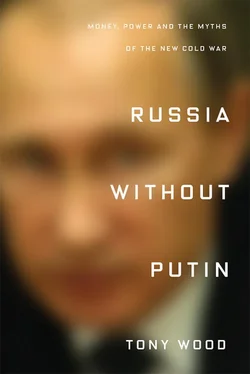Overall, the Putin government’s aim seems to be an inertial scenario. It has entered what political scientist Yekaterina Schulmann has called ‘calorie-conservation mode’. {3} 3 Yekaterina Schulmann, ‘How Regime Self-Preservation Could Accidentally Democratize Russia’, Carnegie Moscow Center, 14 December 2017.
There is an obvious danger here, of aimless drift or complacent decline. Systems that lose their sense of purpose can rapidly end up losing their grip on power, too, overtaken by emergencies they lacked the imagination or energy to foresee. One possible scenario, indeed, is that the imitation-democratic system will gradually run out of steam, so hollowed out from the inside that it eventually crumbles at the slightest popular pressure.
Yet even once toppled, such regimes have often returned in near-equivalent forms, like strange political revenants. In Georgia, for example, Mikheil Saakashvili’s administration eventually replicated many of the authoritarian behaviours of the Shevardnadze government it displaced; further afield, in Egypt, after the hopeful upheavals of Tahrir Square Sisi took up many of the despotic habits of Mubarak. These repetitions were what Dmitri Furman had in mind when he gave his book on imitation democracies the title Spiral Motion – identifying the tendency, across the post-Soviet space and far beyond, for countries governed by such regimes to find themselves circling through variations on the same governmental theme. {4} 4 Dmitri Furman, Dvizhenie po spirali: Politicheskaia sistema Rossii v riadu drugikh politicheskikh sistem , Moscow 2010.
Furman’s compelling metaphor describes a default scenario – and implies that something substantive has to change for a country to break out of the spiral and forge a new trajectory.
Russia’s imitation democracy is capable of reproducing itself whether Putin is in charge or not. If it is to be replaced by something substantively different, an alternative to the system as a whole will have to coalesce – not just an anti-Putin who can take the current president’s place. This is no small task, and it would have to be the work of a large-scale movement rather than an elite plot or a few scattered individuals. Yet it’s possible that Putin’s fourth term might provide an opportunity for such a project to begin to take shape. A period of stasis for the ruling system could also be a valuable interval for those ranged against it, allowing Russians to think about what kind of country might await them beyond imitation democracy, and to imagine what a future without Putin would look like.
–
June 2018
THE SEEDS OF THIS BOOK were sown by many years of discussions with colleagues and comrades at New Left Review . Thank you to the editor, Susan Watkins, for her consistent engagement with and support for the project, and for allowing me time off from my editorial duties there to explore the ideas that have gone into it. Thank you also to Kheya Bag, Rob Lucas, Johanna Zhang and Daniel Finn, and to Dylan Riley for his incisive comments on the NLR article that eventually became Chapter 3of this book. I’m also tremendously grateful to Perry Anderson for his close critical reading of the final manuscript, and for suggestions which improved it significantly.
A preliminary version of Chapter 3was presented at the Centre for Baltic and East European Studies at Södertörn University in October 2011, and I thank the participants in the seminar for their comments, in particular Zhanna Kravchenko for her thoughtful response; thanks also to Irina Sandomirskaia for offering encouragement, and to Sven Hort for making my stay at CBEES possible. Others of the book’s arguments were first sketched out in essays for the London Review of Books , and I’m grateful to Mary-Kay Wilmers for the chance to write regularly on Russian themes there, and to Daniel Soar and the rest of the editorial staff. Likewise to Keith Gessen and n+1, for organizing a symposium on Ukraine in the autumn of 2015 which helped focus my thinking on the Maidan and its aftermath.
Thanks must also go to Sean Guillory and Kyle Shybunko for their perceptive and helpful comments on the final manuscript; to Ilya Budraitskis, Aleksei Penzin and Maria Chekhonadskikh for many insights and conversations about contemporary Russia; to Leo Hollis, my editor at Verso, and to Jacob Stevens, Mark Martin, Anne Rumberger and everyone else at Verso for helping this book into the world. The list of family, friends and colleagues who have at various times been subjected to my ramblings on Russia is lengthy, and I apologize in advance for leaving anyone out – but for now, thank you to my parents, Michael Wood and Elena Uribe; to Gaby Wood, Ava Turner and Beatrice Turner; to Patrick Wood and Holly Chatham; to Richard Reeve, Surmaya Talyarkhan, Andrew Greenall, James Tindal, Susan Jones, Rob Leech, James Leech, Michael Frantzis, David Klassen, Chase Madar, Rachel Nolan, Brian Kuan Wood and Alexander Zevin.
Finally, but most importantly, thank you to Lidija Haas. With incredible patience, intelligence and editorial skill, she helped me rethink this book several times over, and offered unflagging encouragement throughout. Much more than making this book possible, she makes my life immeasurably better.
Abkhazia (Georgia), 131, 133, 167
Abramovich, Roman, 45, 50
Afghanistan, 127, 145
A Just Russia (party), 22
Akunin, Boris (Grigorii Chkhartishvili), 99
Albright, Madeleine, 125
Aleppo, 140
Alexievich, Svetlana, 58
Alfa-Bank, 40, 50
Algeria, 139
Anti-Ballistic Missile Treaty, 127
Anti-Corruption Foundation (FBK), 54, 102
Arab Spring, 96, 138, 139
Åslund, Anders, 31
al-Assad, Bashar, 138–41
Aven, Pyotr, 15, 37, 40
Babitsky, Andrei, 23
Baburova, Anastasia, 149n
Baker, James, 121n
Bank Rossiia, 30
Basaev, Shamil, 18, 105
Baturina, Elena, 38
Belarus, 26, 119, 129, 134, 135, 154
Belovezha agreement (1991), 119
Benjamin, Walter, 68
Berezovsky, Boris, 33, 35, 37, 40, 41, 42, 43, 45
Berger, Sandy, 125
Beslan, 169
Blue Buckets (organization), 99
Bodganov, Vladimir, 30
Bolshevik Revolution, 123
Boos, Georgi, 95
Borodin, Pavel, 16
Borogan, Irina, 49
Bortnikov, Aleksandr, 53
Braguinsky, Serguey, 38–39
Brecht, Bertolt, 64
Brzezinski, Zbigniew, 122, 125
Budanov, Yuri, 149n
Bykov, Dmitrii, 99
Camdessus, Michel, 86
Chaika, Yuri, 103
Chechnya
bid for independence of, 166–67
nationalism in, 168
Russia’s wars in, 18–19, 22–23, 73, 81, 104, 116, 127
Cherkesov, Viktor, 51
Chile, 80n
China, 47, 82, 116, 118, 143, 156, 158, 159, 160, 162
Christopher, Warren, 123
Chubais, Anatoly, 73, 124, 155
on capitalism in Russia, 27
on privatization, 35
during rouble crash, 45
class
Soviet understandings of, 60–61, 63
post-Soviet hierarchies of, 5–6, 66–67
Clément, Karine, 69
Clinton, Bill, 121, 122, 124, 125, 126
Clinton, Hillary, 130, 131, 141, 142
Collective Security Treaty Organization, 134
Colour Revolutions, 12, 128, 139
Committee to Investigate Russia, 142
Commonwealth of Independent States (CIS), 119, 134
Communist Party of the Russian Federation (KPRF), 22, 173
Communist Party of the Soviet Union (CPSU), 34, 62–63, 97
cooperatives, 34
corruption
protests against, 96, 103
in Russia, 52–55
crime, 25, 64, 67, 77
Crimea, 8, 29–30, 101, 113, 132, 133, 136–37, 152, 165, 167, 171
culture workers, 72–74, 81
Читать дальше












